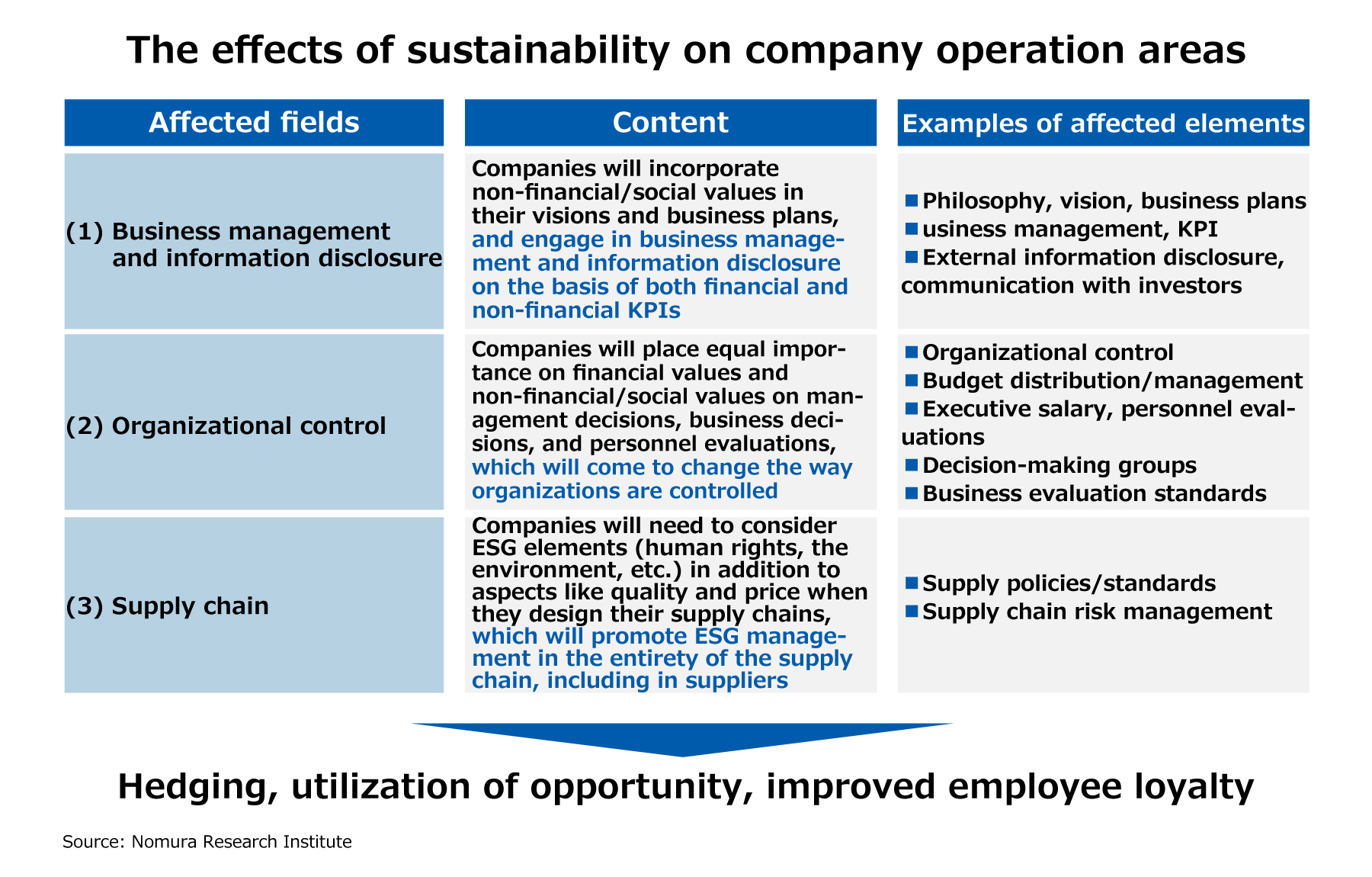
What is sustainability management and why is it indispensable for sustainable growth?
Interest in sustainability management has grown amongst Japanese companies in recent years.
Sustainability management is a form of management in which businesses take into account the effect their decisions would have on the sustainability of society. Though the more ambitious of these companies had engaged actively in CSR (corporate social responsibility) before, it was the July 2017 announcement of the Government Pension Investment Fund (GPIF) that triggered an industry-wide shift towards sustainability management. In their announcement, they established three ESG indices (E: environment, S: society, G: governance), and proclaimed that they would invest a total of 1 trillion yen per year into companies that scored highly for these indices. “Management that incorporates elements of sustainability is likely to become mainstream in the future,” says Eiko Ibuki, an NRI consultant experienced in this field.
An era where solving social issues leads directly to corporate growth
The corporate landscape has gone through dramatic changes in the past few years. More and more investments are being made from the ESG perspective, consumers tend to favor products that are gentle on the environment, and the young, millennial generation (the generation that became adults after the year 2000), have begun paying attention to the CSR aspect of companies when they apply for jobs. In other words, there have been dramatic changes in the values of the various stakeholders for companies in general. Companies, which of course have a stake in these sort of values, have sensed this shift, and have begun accordingly to engage in sustainability management.
“The international regulations and frameworks for social and environmental issues have become more advanced, and especially since the Lehman Shock, people have been increasingly skeptical of the kind of ‘excessive’ capitalism that seeks only short-term gain. Along with these changes in the corporate landscape and stakeholder values have come a change in the company’s long-term perspective and stance on social issues. These aspects, which were previously considered to be mere costs, are now important elements in a company’s competitive strategy. Thus the key to a company’s sustainable growth relies in how quickly they can discern this trend, and incorporate sustainability in the core of their management and business,” points out Ibuki.
Companies receive three benefits when they engage in sustainability management: benefit towards competitive strategy, benefit towards hedging, and benefit towards employee loyalty.
For example, a certain global manufacturer of consumer goods is currently working with national governments, NPOs, and international institutions to combat the public health issues of areas in poverty, and through this process is developing a new market (benefit towards competitive strategy). Another company, a certain U.K. retailer, is displaying their stance on sustainability by publicizing their supply and manufacturing processes. In doing so, they have mitigated the worry that people may have towards the quality of their products and climate change, and have succeeded in the “premiumization” of their products (benefit towards hedging). In Japan as well, companies showing a proactive stance towards sustainability are said to receive a boost in their hiring process and employee loyalty (benefit towards employee loyalty).
The three areas that have to change for sustainability management
Historically in Japan, companies have operated on the principle of “sanpoyoshi.” This is a philosophy passed down from the Omi merchants of the Edo period (1603–1868), and means “good for all three sides,” the three sides being the seller, the customer, and society. This meant that many Japanese companies would often establish long-term visions and ambitions at the very inception of the company. In recent years, however, management that focuses more on short-term sales and increase of profits had begun to drive companies away from this sort of philosophy.
Ibuki says, “the GPIF’s new stance on ESG investment has been quick to draw the attention of Japan’s leading executives, and has led to a sudden uptick of interest in sustainability management. We expect in the future that companies will have to formulate their management foundation from the mid- to long-term perspective, and that sustainability will become a necessary component of these foundations. In order for companies to realize this, however, they must make various changes to their governance systems and processes—in other words, the operation areas of their business.”

There are three operation areas. The first area is business management and disclosure of information. Companies will be expected to incorporate non-financial and social values into their corporate vision and business plans, which will necessitate closer coordination between business departments and headquarters. They will also be expected to be active in disclosing information, not only from the financial perspective, but from the non-financial and social perspectives as well. The second is organizational control. Management must take an interest in sustainability and incorporate elements of it in their decision-making and evaluation mechanisms, to engrain this way of thinking in employees and practice sustainability in the organization as a whole. The last area is the supply chain. The modern supply chain must be designed with ESG and its elements (human rights, the environment, etc.) in mind, in addition to the usual aspects like price and quality. Though this is primarily seen as an area to hedge risk, various efforts towards the supply chain can actually increase the added value of products as a whole.
Expectations are growing worldwide for companies to help solve social issues, and we are now at an age where companies are being questioned as to the reasoning behind their management decisions and businesses. Ibuki predicts that “in the future, we’re going to find it difficult to make management decisions and control organizations through solely financial means. For Japanese companies to be able to utilize their distinctive historical strength, they must be able to incorporate various elements of human rights, environment, and social responsibility into their mid- to long-term business strategies, and change with the times.”
Profile
-
Eiko Ibuki
* Organization names and job titles may differ from the current version.